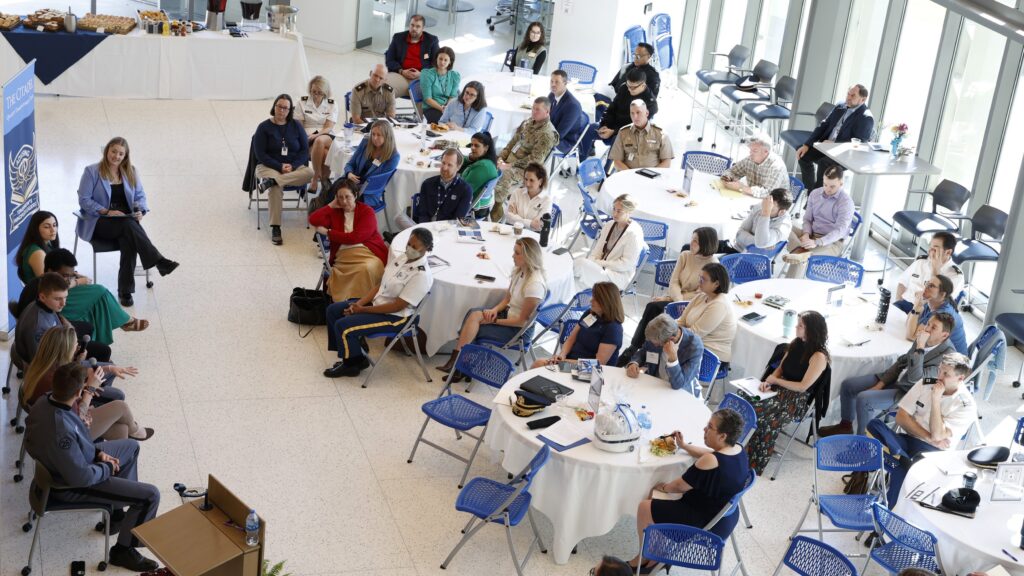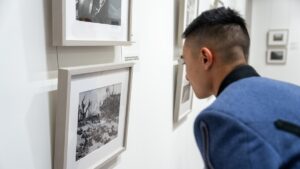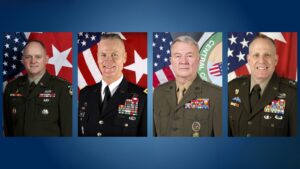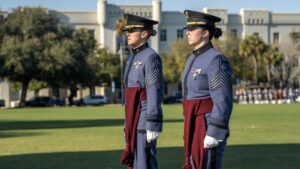
Photo: Citadel cadets, students, faculty and staff gather in Bastin Hall on The Citadel’s campus for the first-ever Advising Summit. (Courtesy: Citadel English professor Tom Thompson, Ph.D.)
By Andrew Granger, CGC ’26
Recently, The Citadel held its first-ever Advising Summit, a campus-wide event inviting faculty, staff and students to engage in an afternoon of collaboration and professional development to strengthen the college’s academic support system.
The summit, themed “Building from Baseline: Sharing Our Current Best Practices,” included a keynote speaker, student panel and breakout presentations, all aiming to help improve advising practices and create a more unified academic community.
“As we continue to develop principled leaders at The Citadel, effective advising plays a pivotal role in shaping the success of our students,” said Stephanie Fye, director of advising at The Citadel. “This summit was an exciting opportunity for all faculty, staff and students to come together, share our best practices and learn from one another.”
The event kicked off with a keynote address from Karen Hauschild, member of the National Academic Advising Association, or NACADA, and the director of the Academic Advising and Planning Center at The College of Charleston. She emphasized that strong advising is key for student retention.
“The most effective way to keep students engaged and enrolled is by keeping them motivated, challenged and moving toward meaningful goals. The best way to achieve this is through thoughtful, informed, academic advising,” said Hauschild, referring to research by Edward ‘Chip’ Anderson, Academic Advising for Student Success and Retention.
Hauschild also covered a problem second-year students tend to encounter, known as “the sophomore slump.” She explained that this burned-out feeling can originate from adjusting to increased academic demands, pressure to choose the right major or career path and not getting the same amount of attention as freshmen. To combat this, Hauschild urged advisors to regularly check in with their students through a variety of methods to ensure they are reaching their goals and supporting their overall well-being.
After Hauschild’s keynote speech, a student panel was held, allowing cadets and students to provide feedback to their advisors. It was one of the most impactful segments of the summit, allowing faculty and staff to ask questions and hear how their advising techniques affected their students directly. Five students – a veteran student, cadet, cadet-athlete, graduate student and transfer student – shared their experiences and answered questions about advising at The Citadel.
“There is no more powerful way for advisors to learn and grow than by hearing directly from the students they serve,” said Tay Thompson, graduate assistant and panel mediator. “The remarkable individuals who participated in the panel offered responses that were not only insightful but profoundly thought-provoking. What resonated most was the importance of fostering collaboration between students and advisors and the critical need to create welcoming spaces – a space where students are met without judgment and where they feel safe to share their academic struggles and personal and professional concerns.”
Finally, faculty and staff presented in several breakout sessions, sharing approaches and tools to advising students through their academic and personal development. Topics included executing the perfect student advising appointment, teaching confidence and self-reliance, equipping students for future success and helping student-athletes and transfer students manage exhausting schedules.
They also urged faculty to encourage students to engage with campus events, build long-term goals, and seek study-abroad and internship opportunities.
Organizers and participants described the summit as the beginning of a shift toward stronger, more student-centered advising at The Citadel. It served as an opportunity for departments from different parts of campus to connect and made the advising process more integrated.
“I’m extremely grateful for the planning team’s hard work and dedication that made the summit a success,” said Fye. “We’re so encouraged by the incredible faculty support, and it was inspiring to hear from our students and learn from presenters who shared innovative strategies and fresh ideas to elevate advising at The Citadel. Together, we’re shaping a brighter future for our community, and we’re already looking forward to another great summit next year!”
Andrew Granger of Atlanta, Georgia earned his bachelor’s degree from The Virginia Military Institute in English, Rhetoric and Humanistic Studies. He is currently working as a graduate assistant in the Office of Communications and Marketing while pursuing a master’s degree in Project Management and competing for The Citadel’s Track and Field program.

 Moore Art Gallery opens “All Hands on Deck” WWII naval photography exhibit
Moore Art Gallery opens “All Hands on Deck” WWII naval photography exhibit The Citadel’s presidential search committee announces four finalists
The Citadel’s presidential search committee announces four finalists Prestigious Cincinnati and MacArthur awards presented to Citadel cadets
Prestigious Cincinnati and MacArthur awards presented to Citadel cadets


